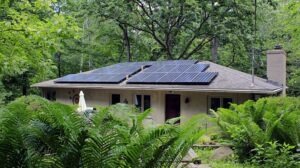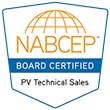 As energy costs continue escalating and environmental concerns become more pressing, you may find yourself considering whether a solar panel system is a good solution for your energy needs. In this guide, we’re sharing the top practical considerations for installing solar panels in homes and businesses to help you make the best choice.
As energy costs continue escalating and environmental concerns become more pressing, you may find yourself considering whether a solar panel system is a good solution for your energy needs. In this guide, we’re sharing the top practical considerations for installing solar panels in homes and businesses to help you make the best choice.
12 Considerations for Investing in a Solar Panel System
Investing in a solar panel system for your home or business involves careful thought and planning. Here are 12 key factors to help you evaluate the process and make sure you get the most out of your investment.
1. Initial Cost
Understanding what is included in a solar panel system cost estimate is the first step. It’s important to evaluate the upfront costs, which include equipment (panels, inverters, mounting hardware), installation, permits, and any additional upgrades needed for your home’s electrical system.
Costs vary by state and depend on the cost-per-watt, which is currently around $2.75/W across the U.S. (before incentives). With this number in mind, you can expect to pay an average of $25,000 to $30,000 for your system installation. Comparing quotes from multiple providers can help you find the best deal and avoid hidden expenses.
2. Financing Options
If you find the solar panel system cost is too high to purchase in full, consider your financing options, including loans, leases, power purchase agreements (PPAs), and solar incentives like federal tax credits, state rebates, and local incentives.
These incentives can significantly lower the overall cost of installing solar. For example, the Residential Clean Energy Credit can help with your solar panel system cost because you can claim up to 30% of the installation costs as a federal tax credit, reducing your overall investment. Be sure to thoroughly research your options to determine which fits your financial situation and long-term goals best.
3. Energy Needs
Assessing your energy needs is essential when considering a solar panel system. Start by examining your current utility bills to understand your usage patterns and anticipate any future changes in consumption. This assessment will help you determine the right size for your solar array, ensuring it meets your present and future energy demands.
4. Roof Condition and Orientation
Make sure your roof is in good condition and ideally positioned to maximize solar exposure. South-facing roofs are typically the best option in the Northern Hemisphere. Ensuring the appropriate orientation and tilt can maximize the efficiency of your solar panel system. Ideally, your roof should be less than 15 years old and have a tilt angle between 30 and 45 degrees to capture the most sunlight throughout the year.
5. Local Regulations and Permits
Before you invest in a solar panel system for your home or business, get familiar with local zoning laws, building codes, and any homeowner association rules that may apply. It’s essential to obtain the necessary permits and ensure you comply with all regulations before installation. Doing so not only keeps you on the right side of the law but also paves the way for a smoother installation process.
6. Utility Policies
Make sure to familiarize yourself with your utility’s net metering policy. This policy dictates how you’ll be credited for any excess energy generated and fed back into the grid. Essentially, net metering allows you to earn credits on your electricity bill for the surplus power your solar panels produce. This can offset your energy costs during times when your system generates less electricity than you use. Knowing these details will help you make an informed decision about your solar investment.
7. System Components
One area you don’t want to compromise on is your solar panel system components. Researching and selecting high-quality solar panels, inverters, and other components is key. Look for warranties and product certifications to ensure reliability and long-term performance. Using quality solar panel system components will make a big difference when it comes to the overall efficiency and longevity of your investment.
8. Installer Selection
Another way to ensure your investment lasts is to choose a reputable, experienced solar installer. When researching your options, check for certifications, read reviews, and ask for references to gauge their credibility. It’s also important they offer comprehensive warranty and maintenance services to support you after installation.
9. Return on Investment (ROI)
When you’re making such a substantial investment, it’s important to understand the potential ROI. To do this, calculate the payback period and potential long-term savings while considering rising energy costs, possible increases in property value, and environmental benefits. This will help you see the full picture of your investment.
10. Maintenance
A solar panel system isn’t a get-it-and-forget-it investment. It does require some maintenance. Regular cleaning and periodic inspections can keep your system running efficiently. Knowing what to expect will help you plan for ongoing upkeep. Typically, this looks like scheduling annual or bi-annual professional inspections to check for any damage or wear and performing routine cleaning to remove dirt, dust, and debris that can obstruct sunlight and reduce efficiency.
11. Energy Storage Options
While sunlight is a proven and powerful energy source, there are times when it’s not available. So, you’ll want to consider your energy storage options. Adding a battery storage system can store excess energy for use during power outages or times of low solar production. This addition can provide extra reliability and peace of mind.
12. Environmental Impact
Finally, consider the environmental impact a solar panel system for your home or business can have. By reducing your carbon footprint and contributing to renewable energy adoption, you are playing a significant role in combating climate change.
Additionally, supporting sustainable energy sources can inspire others in your community to follow suit, amplifying the positive environmental effects. It’s a meaningful way to help combat climate change and promote clean energy — all while saving on your utility bills.
Comprehensive Support for Your Solar Needs
At Ecohouse Solar, we are committed to lowering energy costs and carbon emissions in Ohio — and we love partnering with individuals and businesses ready to do the same. If you have additional questions about installing a solar panel system for your home or business, reach out to us today to speak to one of our solar experts.





 Project Calculator
Project Calculator